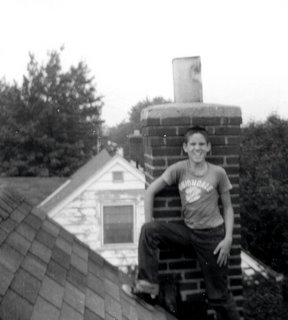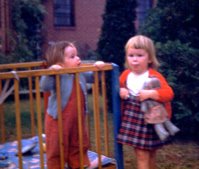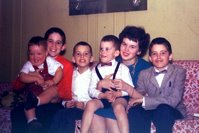I hope the comments don't become a parent care vs. day care debate. We all need to unite to create a society where parents can afford to decide what is best for their families and their children, where parents even have the economic option of caring for their children at home.
US Census Bureau, February 28, 2008
Relatives regularly provide child care to almost half of the more than 19 million preschoolers, according to tabulations released today by the U.S. Census Bureau. Fathers and grandparents were the primary relative child care providers.
The series of tables, Who’s Minding the Kids? Child Care Arrangements: Spring 2005, showed that among the 11.3 million children younger than 5 whose mothers were employed, 30 percent were cared for on a regular basis by a grandparent during their mother’s working hours. A slightly greater percentage spent time in an organized care facility, such as a day care center, nursery or preschool. Meanwhile, 25 percent received care from their fathers, 3 percent from siblings and 8 percent from other relatives when mothers went to work.
I question the unthinking hierarchy set up by the Census Bureau. They seems to be saying mothers are always better than grandparents who are better than institutional day care, which is better than fathers and other relatives. Still I was pleased that the Obamas' grandma solution is more widespread than people realize. I wonder how grandparents can afford to take care of their grandchildren as their pensions and savings disappear. I certainly have no problem with paying relatives for child care.
Were you surprised that 25 percent of preschoolers received care from their fathers? According to the Census Bureau, "Preschoolers whose mothers worked a night or evening shift were more likely to have their father as a child care provider than those whose mothers worked day shifts (39 percent and 18 percent, respectively)." "Research shows that blue collar fathers have actually changed more in terms of their involvement in homemaking and child care than have middle class fathers (including professionals), when their wives are employed away from home. " Middle-class and professional fathers profess to believe in more egalitarian sex roles, but they don't provide the child care.
Although I was fortunate enough to be able to stay home with my 4 daughters for 15 years, I am not a traditionalist who believes all mothers should be home with their babies. I wish more fathers could take care of their young children. I believe children thrive when raised by people who love them--mothers, fathers, grandmothers, grandfathers, aunts, uncles, siblings, close friends--who are a permanent part of their lives. I believe group care too early in life is not the ideal solution; conforming to group norms is hard on toddlers, especially boys. My highly creative first daughter even found all-day kindergarten hard to take. At 3 PM, she warned me : "Mommy, I used all my goodness up in school." The other three thrived in half-day kindergarten.
The energy wasted on the vicious mommy wars could be directed toward Corporate America. The idealistic young feminists of the early 1970's believed that social change was possible to enable both parents to care for their children. As the work week got shorter, that seemed a possible goal. We did not envision a world whether mothers and fathers worked far longer hours than their own fathers had.
It would not require a massive reshaping of the American economy to make it feasible for parents to stay home more with their babies and toddlers. If we can outsource radiology jobs to China or India, we can figure out a way for parents to work partly in the office, partly at home. Most people only have two children; most children at three can benefit from care outside the home. Unlike the parents of my generation, today's young parents have no expectations whatsoever that anyone--government, employers--are going to help them with their work/child care dilemmas.
The argument that taking time off work would ruin career advancement is absurd, particularly in the Internet Age. Soldiers fighting World War II were absorbed back into the economy, given help with education and retraining, without being penalized for leaving their jobs for four or five years. If raising young children were properly valued as an essential contribution to the nation's future, parents need not suffer dire career consequences for working part-time or taking a childrearing break.
Taking care of my grandson in Manhattan, I talk to many nannies in playgrounds and playrooms. I am aware that very few working parents can afford even a badly paid nanny. Virtually all are women of color; most come from foreign countries. Too many have left their children with relatives in their own country. One superb young nanny told me, "this job hurts my heart." Nannies come to love the children they care for, but parents can call them Sunday night and tell them they are not needed anymore. Few are paid salaries they can live on; few have health care benefits.
Tragically, women's returning to work had resulted in the devaluing of nurturing young children. Day care workers are paid too badly to make a long-term commitment possible. Taking care of children under five is not a viable career option unless you have a working partner who makes a more adequate salary. If we truly wanted the best for our children, day care teachers' training and compensation would resemble that of grade school teachers. Companies would provide excellent onsite day care, so mothers could spend more time nursing their babies than pumping in the toilet, so parents could play with their babies during lunch and coffee breaks.
There are excellent day care centers. I suggest parents join the National Association for the Education of Young Children. The NAEYC provides a list of accredited child care centers. But high-quality child care is out of the reach of most parents. Surely society could figure out a way to make it more possible for parents to take care of their own children. If a mother or father cares for their own children, their work is not included in the GNP. If he cares for someone else's child and hires someone to take care of his own child, both salaries are included in the GNP, even though the children almost certainly receive less optimal care.
My granddaughter, my grandniece, and my grandnephew go to excellent day care centers. Excellent day care seems a much better option than isolated nanny care. Most parents cannot afford excellent day care. But group care starting in fancy doesn't work for all children. I suspect only my youngest would have thrived. My first daughter even found all-day kindergarten hard to take. At 3 PM, she warned me : "Mommy, I used all my goodness up in school." The other three were happier in half-day kindergarten. Y
Early child care seems almost entirely women's job. How many day care centers, nursery schools, kindergartens have male teachers? In NYC playgrounds, I occasionally meet a male babysitter who has a flexible work schedule. I have yet to meet a man who cares for young children as his regular job who is not a father or grandfather. How old was your child before he had his first male teacher? What message does that send to children?
The choices facing my daughters in 2008 are no better, possibly worse, than those facing my husband and me in 1973. We could live frugally on my husband's income. Enough parents were at home to create highly successful playgroups and babysitting coops, so we could work part-time or go to school. Mutual aid was a more realistic possibility.
I believe how society treats its children, not its wealth, not its military strength, is a measure of its worth. Feminists, nonfeminists, parents, grandparents, progressives need to unite in a movement for a family-friendly, child-friendly society.







